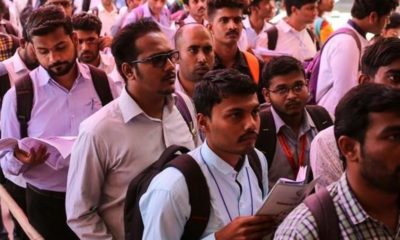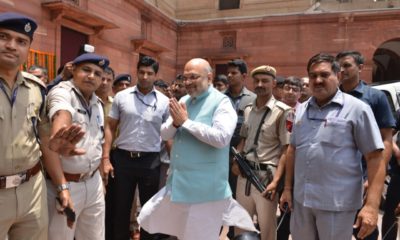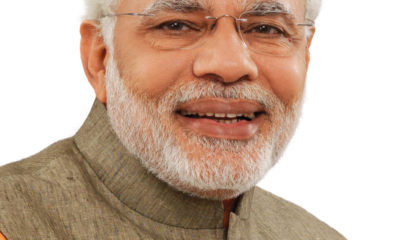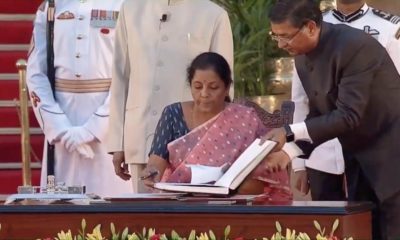Feature
BSF trooper Tej Bahadur Yadav dismissed from service

New Delhi: BSF trooper Tej Bahadur Yadav-who triggered a political uproar when his video clip on “substandard food” served to BSF men went viral in January- was today dismissed from service, an official said.
He has the option to appeal in court against the verdict within three months.
The video clip had triggered an uproar across the country, with the Prime Minister’s Office and the Home Ministry seeking detailed reports from the Border Security Force (BSF).
Yadav’s dismissal from service comes after a BSF Summary Security Force Court (SSFC) in Jammu found the BSF Constable-employed with the 29th Battalion- guilty of indiscipline. The SSFC commenced from April 13 and concluded on Wednesday.
“Yadav has been found guilty of all charges and awarded dismissal from service today (Wednesday) as per the provisions of the BSF Act and rules. The individual (Yadav) has options to appeal to higher court against the verdict within three months,” an SSFC statement said.
The SSFC order said, “Yadav made false allegations on the social media regarding the quality of food and did not adhere to formal grievance redressal mechanism in the force.”
“(He) neglected to obey the general orders of the force in which he carried two mobile phones while on operational duty, (which goes) against the SOP (Standard Operation Procedure), and also posted photographs in uniform on social media in contravention of instructions.”
The BSF court said Yadav was given all opportunities for defence during its proceedings.
Yadav, wearing a camouflage uniform and carrying a rifle, posted a video clip on a social media website in January to complain about the quality of food served to security personnel and accused unnamed officers of illegally selling food supplies meant for troopers.
Since then, the trooper was facing the inquiry on various charges, including indiscipline, and his plea for voluntary retirement was rejected by authorities.
Entertainment
Meghalaya Reserves Legalized Gambling and Sports Betting for Tourists

The State Scores Extra High on Gaming-Friendly Industry Index
Meghalaya scored 92.85 out of 100 possible points in a Gaming Industry Index and proved to be India’s most gaming-friendly state following its recent profound legislation changes over the field allowing land-based and online gaming, including games of chance, under a licensing regime.
The index by the UK India Business Council (UKIBC) uses a scale of 0 to 100 to measure the level of legalisation on gambling and betting achieved by a state based on the scores over a set of seven different games – lottery, horse racing, betting on sports, poker, rummy, casino and fantasy sports
Starting from February last year, Meghalaya became the third state in India’s northeast to legalise gambling and betting after Sikkim and Nagaland. After consultations with the UKIBC, the state proceeded with the adoption of the Meghalaya Regulation of Gaming Act, 2021 and the nullification of the Meghalaya Prevention of Gambling Act, 1970. Subsequently in December, the Meghalaya Regulation of Gaming Rules, 2021 were notified and came into force.
All for the Tourists
The move to legalise and license various forms of offline and online betting and gambling in Meghalaya is aimed at boosting tourism and creating jobs, and altogether raising taxation revenues for the northeastern state. At the same time, the opportunities to bet and gamble legally will be reserved only for tourists and visitors.
“We came out with a Gaming Act and subsequently framed the Regulation of Gaming Rules, 2021. The government will accordingly issue licenses to operate games of skill and chance, both online and offline,” said James P. K. Sangma, Meghalaya State Law and Taxation Minister speaking in the capital city of Shillong. “But the legalized gambling and gaming will only be for tourists and not residents of Meghalaya,” he continued.
To be allowed to play, tourists and people visiting the state for work or business purposes will have to prove their non-resident status by presenting appropriate documents, in a process similar to a bank KYC (Know Your Customer) procedure.
Meghalaya Reaches Out to a Vast Market
With 140 millions of people in India estimated to bet regularly on sports, and a total of 370 million desi bettors around prominent sporting events, as per data from one of the latest reports by Esse N Videri, Meghalaya is set to reach out and take a piece of a vast market.
Estimates on the financial value of India’s sports betting market, combined across all types of offline channels and online sports and cricket predictions and betting platforms, speak about amounts between $130 and $150 billion (roughly between ₹9.7 and ₹11.5 lakh crore).
Andhra Pradesh, Telangana and Delhi are shown to deliver the highest number of bettors and Meghalaya can count on substantial tourists flow from their betting circles. The sports betting communities of Karnataka, Maharashtra, Uttar Pradesh and Haryana are also not to be underestimated.
Among the sports, cricket is most popular, registering 68 percent of the total bet count analyzed by Esse N Videri. Football takes second position with 11 percent of the bets, followed by betting on FIFA at 7 percent and on eCricket at 5 percent. The last position in the Top 5 of popular sports for betting in India is taken by tennis with 3 percent of the bet count.
Local Citizens will Still have Their Teer Betting
Meghalaya residents will still be permitted to participate in teer betting over arrow-shooting results. Teer is a traditional method of gambling, somewhat similar to a lottery draw, and held under the rules of the Meghalaya Regulation of the Game of Arrow Shooting and the Sale of Teer Tickets Act, 2018.
Teer includes bettors wagering on the number of arrows that reach the target which is placed about 50 meters away from a team of 20 archers positioned in a semicircle.
The archers shoot volleys of arrows at the target for ten minutes, and players place their bets choosing a number between 0 and 99 trying to guess the last two digits of the number of arrows that successfully pierce the target.
If, for example, the number of hits is 256, anyone who has bet on 56 wins an amount eight times bigger than their wager.

























